|
|
|
Sort Order |
|
|
|
Items / Page
|
|
|
|
|
|
|
| Srl | Item |
| 1 |
ID:
169363


|
|
|
|
|
| Summary/Abstract |
The main purpose of this article is to examine the absence of political security and its consequences on state security of Ethiopia. The study was conducted through case study design and used qualitative research approach, and key informant interview was held. The main finding of the article is that in Ethiopia there is a prevalence of political insecurity which is committed by government officials via security sectors and which has led to the existence of mistrust on security sectors, the expansion of mob justice and the existences of social insecurity in the state.
|
|
|
|
|
|
|
|
|
|
|
|
|
|
|
|
| 2 |
ID:
098670
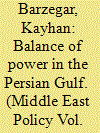

|
|
|
| 3 |
ID:
072963
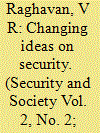

|
|
|
| 4 |
ID:
131980
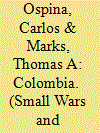

|
|
|
|
|
| Publication |
2014.
|
| Summary/Abstract |
From 1965 to the present, Colombia has been confronted by the insurgency of the Revolutionary Armed Forces of Colombia (FARC). The threat reached a new level in 1996 with the advent of mobile warfare, whereby large units sought to neutralize the military in an effort to seize power and institute a Marxist-Leninist regime. Unlike Vietnam, what followed was a regaining of the strategic initiative by the government and a decimation of the insurgent threat. This was accomplished with US assistance but from first to last was driven by Colombian leadership and strategy. The strategy which led to this signal change, 'Democratic Security', unfolded under the leadership of President Álvaro Uribe. It was a civil-military partnership, which sought to expand the writ of Colombian democracy to all elements of society. Securing the population provided the shield behind which economic, social, and political life could occur as driven by the will of the people. It was the agreement upon legitimacy as the strategic goal and reform as the route to that goal which allowed the Colombians and the Americans to work so well together.
|
|
|
|
|
|
|
|
|
|
|
|
|
|
|
|
| 5 |
ID:
130942
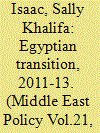

|
|
|
|
|
| Publication |
2014.
|
| Summary/Abstract |
This paper tackles the political and security complications of the Egyptian transition from its inception in January 2011 until the fall of the Muslim Brotherhood president, Mohamed Morsi, in July 2013, with a primary focus on how these complications are of strategic importance to Europe. It starts with inferring Egypt's role in European Union (EU) approaches to security in the Mediterranean, which were acknowledged in the 2003 European Security Strategy and then largely interpreted in the 2004 European Neighborhood Policy. It argues that the old EU democracy-stability dilemma persisted in Europe's approach to the Egyptian transition, especially during Morsi's one-year presidency. In discussing the current political and security complications of the Egyptian transition and how they constitute strategic concerns to Europe, the analysis tackles undermined social cohesion in Egypt due to processes of repolarization in Egyptian society after July 2013; the question of Egypt's porous borders with the Hamas-controlled Gaza Strip; the emergence of the Sinai Peninsula as a jihadist center; and the rising importance of economics in the EU-Egyptian relationship
|
|
|
|
|
|
|
|
|
|
|
|
|
|
|
|
| 6 |
ID:
153211


|
|
|
|
|
| Edition |
3rd ed.
|
| Publication |
Cambridge, Polity Press, 2017.
|
| Description |
ix, 256p.pbk
|
| Series |
Key Concepts Series
|
| Standard Number |
9781509510283
|
|
|
|
|
|
|
|
|
|
|
|
Copies: C:1/I:0,R:0,Q:0
Circulation
| Accession# | Call# | Current Location | Status | Policy | Location |
| 059107 | 323/FRE 059107 | Main | On Shelf | General | |
|
|
|
|
| 7 |
ID:
080891
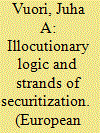

|
|
|
|
|
| Publication |
2008.
|
| Summary/Abstract |
Convincing research programmes often use a variety of data from cases in different contexts; in order to reach a wider understanding, the models and hypothesis of securitization studies have to be applied to broad groups of cases. The research programme of securitization studies is formed around the leading idea of securitization being a social process achieved through speech acts. I argue that by explicating the concept of securitization through illocutionary logic, it can be utilized to study security politics in non-democratic contexts in addition to the favoured liberal democratic one, where the majority of empirical analysis has been conducted so far. In addition, I present clarifications to the concepts of 'audiences' and 'special politics' used in the theory. The theoretical discussion is illustrated with examples from the Chinese political system
|
|
|
|
|
|
|
|
|
|
|
|
|
|
|
|
| 8 |
ID:
133842
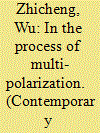

|
|
|
|
|
| Publication |
2014.
|
| Summary/Abstract |
The international system is the relatively stable framework of international relations constituted by various international actors, and represented by the great powers. The various international actors interact with one another in the framework. Therefore, against the current background of deepended globalization.
|
|
|
|
|
|
|
|
|
|
|
|
|
|
|
|
| 9 |
ID:
144017
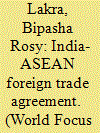

|
|
|
|
|
| Summary/Abstract |
New Delhi’s economic policy pursues a dynamic interaction with other countries deepening its commitment towards its goals to deepen and secure national economy, political security and regional integration. ASEAN (Association of South East Asian Nations) in this stance has been a crucial link towards providing regional cooperation among member nations and India. There is little doubt over China’s already grown influence in the South Asia and Asia- Pacific region with it showcasing its hard power status politically and militarily.
|
|
|
|
|
|
|
|
|
|
|
|
|
|
|
|
| 10 |
ID:
132401


|
|
|
|
|
| Publication |
2014.
|
| Summary/Abstract |
Indonesia is often regarded as the natural leader of the Association of Southeast Asian Nations (ASEAN) in light of its geographical dimensions, large population, strategic position and natural resources. The country has felt entitled to a position of leadership and has generally been recognized by the other ASEAN members as first among equals. While the de facto leadership of Indonesia has traditionally been accepted as conventional wisdom, little attention has been given to the extent to which Jakarta has actually succeeded in exercising leadership in ASEAN and how its attempt to do so has been perceived by the other Southeast Asian states. The paper explores this question by focusing on Indonesia's ability to provide international public goods in the areas of security and economics, engage in conflict management and promote institution building. It argues that the country has sought to establish a stable and autonomous security environment, to conduct conflict meditation efforts in the Cambodian conflict and the South China Sea disputes, and to develop institutional mechanisms to promote security, democracy and human rights among other issues. Still, Indonesia's leadership in ASEAN has been incomplete due to resistance from some members to its preference for an autonomous regional order and in recent years a democratic form of domestic governance. Its leadership has so far also been limited to the political and security spheres, leaving other sectors, like the economy, to others.
|
|
|
|
|
|
|
|
|
|
|
|
|
|
|
|
| 11 |
ID:
148040
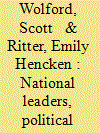

|
|
|
|
|
| Summary/Abstract |
States frequently form military coalitions, and these collaborations matter a great deal for international politics, yet their origins are poorly understood. Building coalitions in international crises improves military prospects. At the same time, it requires policy concessions to compensate partners. We show that a national leader’s job security affects her willingness to make this tradeoff. First, politically insecure leaders are more willing to form coalitions than secure leaders. The former face greater incentives to accept tradeoffs in order to bolster their chances of victory and thereby improve their chances of remaining in power. Second, politically insecure leaders are also less selective in their choice of partners. Their willingness to make larger policy concessions leads them to form coalitions with states of increasingly divergent foreign policy preferences. A sample of crises from 1951-1999 provides statistical support for these arguments.
|
|
|
|
|
|
|
|
|
|
|
|
|
|
|
|
| 12 |
ID:
080499


|
|
|
|
|
| Publication |
2007.
|
| Summary/Abstract |
This article explores the enduring impact of the Western strategy of 'peaceful evolution' (heping yanbian) on China's political security. This non-military strategy is given an added significance in an era of the lone superpower, when American military might can provide the buttress. 'Peaceful evolution' can also overlap with the US notion of 'regime change', which often entails military intervention to bring about a desired political transformation in a particular state. Specifically, the strategy of 'peaceful evolution' still constitutes a serious threat to China because it needs to continue opening up to the West for the sake of economic modernisation
|
|
|
|
|
|
|
|
|
|
|
|
|
|
|
|
| 13 |
ID:
128971
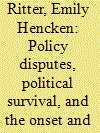

|
|
|
|
|
| Publication |
2014.
|
| Summary/Abstract |
Under what conditions will a state repress its citizens? The literature examining human rights violations lacks consensus over exactly how repression and dissent are interrelated. I argue that contradictions have arisen because scholars have not derived expectations consistent with modeling three common assumptions: (1) dissent and repression are causally interrelated (2) states and groups are in conflict over some policy or good and (3) authorities repress to remain in office. I develop a formal model based on these principles, and I predict that changes in the same independent variable can have divergent effects on the onset and severity of repression. Using coded event data for all states from 1990 to 2004 and a two-tiered estimator, I find that increases in executive job security decrease the likelihood that repression will occur in the first place, but increase the severity of observed violations.
|
|
|
|
|
|
|
|
|
|
|
|
|
|
|
|
| 14 |
ID:
055444


|
|
|
| 15 |
ID:
120727
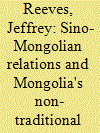

|
|
|
|
|
| Publication |
2013.
|
| Summary/Abstract |
The following article examines the effect China has on Mongolia's non-traditional security. Using the Copenhagen School's approach to non-traditional security, the article argues that Mongolia's economic dependence on China coupled with weak political security have allowed China to develop structural power over Mongolia's domestic institutions. This structural power also negatively affects Mongolia's societal and environmental security. Chinese structural power, therefore, has a net negative effect on Mongolia's domestic non-traditional security, despite Chinese policies that seek to maintain good relations with Mongolia. This suggests that China is not in complete control of its relations with Mongolia and that its use of economic ties to drive relations with Mongolia contains elements that ultimately undermine its position and Mongolia's security.
|
|
|
|
|
|
|
|
|
|
|
|
|
|
|
|
| 16 |
ID:
134142
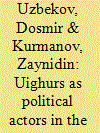

|
|
|
|
|
| Publication |
2014.
|
| Summary/Abstract |
In the Middle Ages, the Uighurs, who are one of the oldest and largest peoples of Central Eurasia (CE), were driven into East Turkestan and then conquered by the Qing Empire. The Chinazation policy carried out in relation to these people led to the mass exodus of the freedom-fighting Uighurs to the CE countries.
The Uighurs are vigorously engaged in economic activity; in other spheres they are traditionally closed and alienated from the outside world, which prevents them from becoming actively integrated into contemporary society.
This article analyzes the roots and reasons for this social phenomenon, which is having a certain influence on the foreign and domestic policy of the Kyrgyz Republic (KR), as well as on political stability and security of the entire Central Asian region.
|
|
|
|
|
|
|
|
|
|
|
|
|
|
|
|
| 17 |
ID:
097002
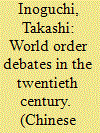

|
|
|
|
|
| Publication |
2010.
|
| Summary/Abstract |
Takashi Inoguchi is Professor Emeritus of University of Tokyo and President of University of Niigata Prefecture. He gratefully acknowledges comments on earlier drafts of this article made by the late Hayward Alker, Tahir Amini, Thomas Biersteker, Andrew Hurrell, Yuen Foong Khong, Patricia Owens and Ann Tickner, as well as two anonymous reviewers.
|
|
|
|
|
|
|
|
|
|
|
|
|
|
|
|
|
|
|
|
|